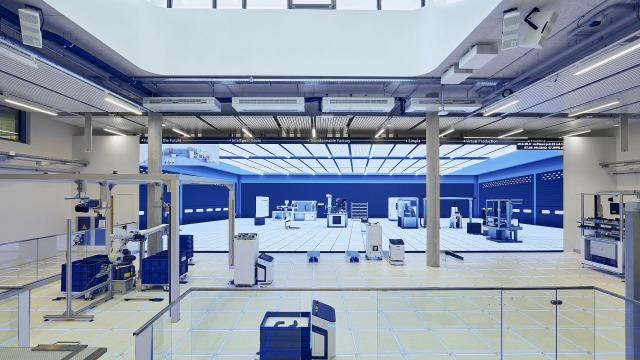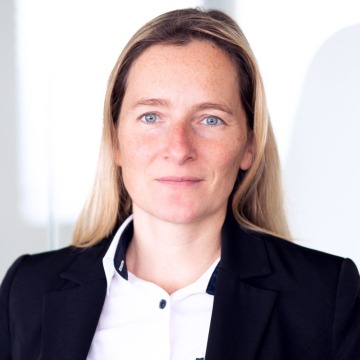



The market for fast moving consumer goods (FMCG) is characterized by enormous cost pressure. Achieving maximum productivity therefore remains the central issue. However, flexibility for smaller batch sizes, maximum transparency across the entire value stream and sustainability through energy efficiency and the recyclability of production equipment are also becoming increasingly important. As experience has shown, stand-alone solutions that focus on only one of these aspects contribute very little to the overall result. The decisive factor here is the intelligent merging and linking of the entire value stream with all production steps and technologies to ensure optimum interaction with each other and with intralogistics.
Open interfaces and standardized data formats provide the framework for productivity gains in greenfield and brownfield applications. Modern automation solutions such as mechatronic subsystems for handling, pressing and joining tasks or app-based software functions can be integrated quickly and easily. They shorten engineering times and reduce complexity – both during commissioning and production changes. Flexible chain conveyors provide reliable long-distance transport, while direct-driven modules are in use in short-cycle applications at the individual stations.
Given the trend towards smaller batch sizes and the clearly noticeable shortage of skilled workers, more and more machine operators are also turning to cobots. They adapt to new products and sizes without programming and work together with humans, e.g. for co-packing tasks, without a safety fence. These changes in production processes are reflected in autonomous mobile robots for intralogistics which transport load carriers of various sizes and weights as needed without the need for refitting. At the end of the line, modern handling systems take care of mixed palletizing, for example. For high precision in handling tasks up to 6 kg, sensor-based compensation modules can be used, which can be easily connected to a Cartesian linear system or a robot.
If these various modules are to mesh perfectly, they must be transparent but at the same time fit reliably into lines. The key here is not to use everything from one manufacturer, but rather to exploit the advantages of open ecosystems: Open interfaces and standardized data formats on the one hand, and the creativity and innovative power of numerous independent providers from this ecosystem on the other.
As a result, end users and line integrators can achieve long-term independence from individual providers and keep brownfield applications up to date with minimal effort. This benefits sustainability too: Modules can be recycled more easily when modifications are made. Edge devices can also be used to integrate older stations into energy management systems or visualize their power consumption as a first step. In open ecosystems, there is a suitable solution for every requirement.
Media Assets
Basic Information Bosch Rexroth
As one of the world’s leading suppliers of drive and control technologies, Bosch Rexroth ensures efficient, powerful and safe movement in machines and systems of any size. The company bundles global application experience in the market segments of Mobile Applications, Machinery Applications and Engineering, and Factory Automation. With its intelligent components, customized system solutions and services, Bosch Rexroth is creating the necessary environment for fully connected applications. Bosch Rexroth offers its customers hydraulics, electric drive and control technology, gear technology and linear motion and assembly technology, including software and interfaces to the Internet of Things. With locations in over 80 countries, more than 31,000 associates generated sales revenue of around 6.2 billion euros in 2021.
Basic Information Bosch
The Bosch Group is a leading global supplier of technology and services. It employs roughly 402,600 associates worldwide (as of December 31, 2021). The company generated sales of 78.7 billion euros in 2021. Its operations are divided into four business sectors: Mobility Solutions, Industrial Technology, Consumer Goods, and Energy and Building Technology. As a leading IoT provider, Bosch offers innovative solutions for smart homes, Industry 4.0, and connected mobility. Bosch is pursuing a vision of mobility that is sustainable, safe, and exciting. It uses its expertise in sensor technology, software, and services, as well as its own IoT cloud, to offer its customers connected, cross-domain solutions from a single source. The Bosch Group’s strategic objective is to facilitate connected living with products and solutions that either contain artificial intelligence (AI) or have been developed or manufactured with its help. Bosch improves quality of life worldwide with products and services that are innovative and spark enthusiasm. In short, Bosch creates technology that is “Invented for life.” The Bosch Group comprises Robert Bosch GmbH and its roughly 440 subsidiary and regional companies in some 60 countries. Including sales and service partners, Bosch’s global manufacturing, engineering, and sales network covers nearly every country in the world. With its more than 400 locations worldwide, the Bosch Group has been carbon neutral since the first quarter of 2020. The basis for the company’s future growth is its innovative strength. At 128 locations across the globe, Bosch employs some 76,100 associates in research and development, of which more than 38,000 are software engineers.
Press Contact

Spokesperson technology topics
Manuela Kessler
+49 9352 18-4145
Manuela.Kessler@boschrexroth.de